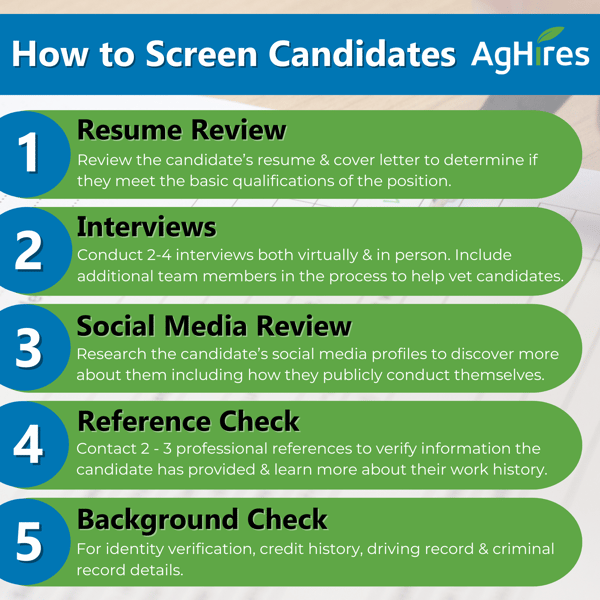-1-2-1.jpg)
Hiring new talent for your ag business is a time-consuming, intricate process that requires careful attention to detail and dedication, demanding even more so in the current competitive market.
A common mistake employers make when attempting their own ag recruiting is not taking the proper steps to screen candidates. Choosing a handful of applicants who look good on paper then conducting a couple of interviews simply isn’t enough to be sure if they are the right long-term hire. Taking the time to properly screen each candidate can help you find your perfect hire in less time, with less risk of turnover, and bring continued success to your farm or ag business.
In this article, our team of ag recruiters outline 5 steps to thoroughly screen candidates and ensure they are the right hire for your agriculture operation.
1. Resume & Cover Letter
The resume and cover letter are the starting point for screening candidates. A quick glance at a candidate’s resume can give you an initial impression of the qualities they possess, or lack, and give you a general idea if they could be a potential fit for the position.
Employers should use resumes as a starting point to vet candidates, but don’t overread the resumes. If a candidate’s resume checks all the other boxes besides one or two of your requirements, don’t rule them out just yet. A piece of paper cannot tell you all you need to know about a candidate. An initial interview can answer any outstanding questions or hesitations you may have about their skills or experience – so don’t rely too heavily on the resume beyond determining if they meet most of your wish list items.
If the candidate includes a cover letter with their application, it can serve as an additional piece of information on the candidate’s experience, skills, and even personality. A cover letter can provide further detail on how the candidate's skills and background can align with the role, and may include their explanation on why they were attracted to this position and see themselves as a fit.
2. Interviewing
Phone Interview
If the candidate’s resume and cover letter give you a sense of excitement, it’s time to set up the first interview. Rather than jumping straight into an in-person interview, we suggest starting with a phone interview. Sometimes, phone interviews can even serve as a more casual step in the process, allowing you to get to know the candidate’s personality before getting too technical. However, use this time efficiently and ask some of the questions you need clarification on regarding their experience.
In the first interview, provide the candidate with an overview of the position, what a typical day looks like, and what it’s like to work for your company. A strong candidate should come prepared with their own questions to ask regarding the company and role. The employer may use this time to get a better idea of the candidate’s background, skills, and future career goals. The phone interview may last anywhere from 30 minutes to an hour, and is a good starting point to explore if it’s a good fit for both parties.
Video Interview
If the phone interview goes well, an appropriate next step may be a virtual, or video interview. This is where you will dive deeper into the candidate’s specific skills and relatable experience and discover their potential to step into this role successfully.
We recommend pulling in another team member or two in this stage of the interview process to gather multiple perspectives on the candidate and avoid biased opinions. This may be another company leader or team member(s) who would work directly with this hire.
On-site Interview
After a successful video interview, an in-person, or on-site interview should take place next. This is a great opportunity for the candidate to meet members of the team, see the work environment, and ask more specific questions about the position.
Provide the candidate with a tour of the farm or facility and give them a clear idea of what their day in the position would look like. Have them meet with other team members to gauge their cultural fit and interactions with other employees.
Conducting 2-4 interviews with a candidate is appropriate for most positions. High-level contributors or leadership positions may require more, but it’s important to consider the candidate’s time and the nature of the position when determining how many interviews are necessary.
3. Social Media
Social media screening is when an employer gathers information on a candidate by researching their profiles and activity online. Social media sites such as Facebook, Instagram, TikTok, and Twitter offer a free, easy glimpse into who a person really is through the content they post or interact with. Employers may look at social media to glean insights into a candidate's behavior and professionalism, communication skills, likeliness to succeed, and potential cultural fit into their ag business.
When using social media as a screening tool, you must take some precautions to avoid any discrimination or privacy invasion. While there are currently no state laws prohibiting you from searching candidates’ publicly available information via social media, what you do with that information can open you up to legal risk.
Some information you may discover such as gender, race, age, disabilities, pregnancy status, political views, and religious affiliation is legally prohibited to use when considering candidates. However, you can use social media to consider things such as profanity, proof of drug or alcohol use, and their public online interactions with others. Social media screening should be used by employers to discover how a candidate publicly conducts themselves and if they would make a good cultural fit.
Learn more about social media screening.
4. Reference Checks
Reference checks are an additional screening step employers can take later in the hiring process to learn more about a candidate. More specifically, about their work history, skills, and working relationships. A reference check can make or break your hiring decision, based on the information you learn.
Reference checking can help verify the information the candidate has already provided about their past work history, skills, and experience from a source other than the candidate themselves. This ensures the candidate is who they say they are, plus allows you to gather more information directly from their previous colleagues.
Before an offer is extended, contact 2-3 references provided by the candidate. Keep the call brief, between 5-10 minutes, and ask each reference the same set of questions. We recommend asking a handful of these questions or similar:
- What was your relationship with the candidate and how long did you work together?
- What were their main responsibilities?
- What are they naturally great at?
- What is an area they could further grow in?
- How would you describe what it’s like to work with them?
- Have you seen them manage other employees? If so, how would you describe their management style?
- Would you like to add anything else?
Verify if the information you received from the candidate’s resume and interviews match up with the information from their references, and determine if they are still a candidate you would like to pursue.
5. Background Check
If you have completed steps 1-4, you can almost feel 100% confident about hiring your new candidate. Conducting a background check is the final step you can take to ensure you’re hiring the right individual for your farm or ag business.
Background checks verify a candidate’s identity and social security, their credit report, and criminal record. Verifying these items can help avoid mis-hires that could pose your company legal or financial risk or hurt your reputation.
Often, the background check process can occur after the offer has already been extended, or even accepted. The process can take a few days, so don’t wait for the results of a background check before extending your offer to avoid the risk of losing your top candidate.
Some companies conduct background checks themselves, while others outsource their background checks. AgHires offers background check services to give you peace of mind when hiring new employees for your ag business.

Partner with an Agriculture Recruitment Firm
At AgHires, we know that hiring for your farm or ag business requires time, effort, and resources that aren't always available. That’s why our team of agriculture recruiting experts are here to do the heavy lifting, freeing your valuable time from screening and vetting candidates.
Partnering with AgHires will give you the best leverage when it comes to screening and hiring candidates for your farm or agribusiness. With our in-depth screening process and eye for identifying top talent in agriculture, we ensure we’re placing only the highest quality candidates in front of you.
Let AgHires find the needle in the haystack so you can focus your efforts where they’re needed most. Learn more about our professional recruiting services.
Discover more hiring advice and free resources from our team of agriculture recruiters by visiting AgHires.com.





